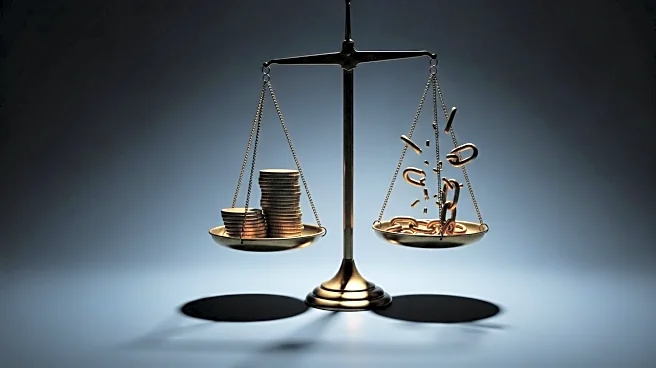What's Happening?
Ray Dalio, the founder of Bridgewater Associates and a prominent hedge fund manager, has expressed concerns that the United States may be entering a new form of 'civil war' due to increasing inequality, national debt, and disruptions in the global geopolitical order. In a recent interview with Bloomberg TV, Dalio highlighted various 'wars' currently affecting the U.S., including financial, technological, and geopolitical conflicts, alongside military tensions. He emphasized that these issues are creating irreconcilable differences within the country, contributing to a period of heightened disorder and polarization.
Why It's Important?
Dalio's warnings are significant as they underscore the potential economic and political challenges facing the U.S. His concerns about the national debt, which stands at nearly $38 trillion, and the debt-to-income ratio of approximately 120 percent, suggest that the country could face severe financial strain. This situation may lead to a 'death spiral' for the economy, affecting government finances and potentially triggering broader global strife. Dalio's analysis reflects a broader concern among economists about the fiscal health of the U.S., with rising debt levels and wealth inequality posing risks to economic stability.
What's Next?
The fiscal challenges highlighted by Dalio are expected to persist, with projections indicating that the budget signed into law in July could increase the deficit by trillions over the next decade. Economic analysts and watchdogs will likely continue to monitor these developments closely, as the U.S. navigates its internal and external conflicts. The potential for increased polarization and disorder may prompt discussions among policymakers and stakeholders about strategies to address these issues and mitigate their impact on the economy and society.
Beyond the Headlines
Dalio's analysis points to deeper historical cycles and the potential for global conflict, drawing parallels to the late 1930s. The breakdown of the U.S.-led world order and rising unrest could lead to significant shifts in international relations and domestic governance. The ethical and cultural dimensions of wealth inequality and political polarization may also become more pronounced, influencing public discourse and policy decisions.








